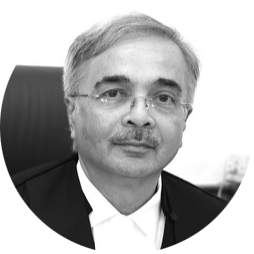N.V. Anjaria

N.V. Anjaria
Sitting Judge of the Supreme Court of India
Assumed Office30th May, 2025
Retires On22nd Mar, 2030
Previously
Chief Justice of the Karnataka High Court25 February 2024 - 29 May 2025
Permanent Judge of the Gujarat High Court6 September 2013 - 24 February 2024
Additional Judge of the Gujarat High Court 21 November 2011 - 5 September 2013
Profile
Early life and Education
Justice Nilay Vipinchandra Anjaria was born in Ahmedabad on 23 March 1965. He has ancestral roots in Mandvi, Kachchh. He hails from a family of lawyers.
He graduated with an LL.B degree from Sir L.A. Shah Law College in 1988 and pursued his Master’s in law the following year from the University of Ahmedabad School of Law, Ahmedabad.
Career as a Judge
Justice Anjaria was first elevated to the Bench as an Additional Judge of the Gujarat High Court on 21 November 2011. He became a permanent judge on 6 September 2013.
On 25 February 2024, took oath as the Chief Justice of the Karnataka High Court.
On 26 May 2025, the Collegium led by Chief Justice B.R. Gavai recommended his appointment as a Judge of the Supreme Court. This was confirmed by the Union three days later, on 29 May.
Justice Anjaria is expected to serve a tenure of four years and nine months and will retire on 22 March 2030.
Notable Judgements
In Patel Dharmeshbhai Naranbhai v Dharmendrabhai Pravinbhai Fofani, (2023) Justice Anjaria upheld the state government’s closure of slaughter houses and meat shops on grounds of non-compliance with food safety laws. He held that the freedom to trade or right to do business has to yield to the public health norms and the restrictive compulsions needed to be enforced in larger public good.
In Kolasani Sai Yashwanth Reddy v State of Gujarat Justice Anjaria authored the judgement which struck down Rule 7(1)C(4) of Gujarat Professional Medical Educational Courses (Regulation of Admission and Payment of Fees) (Amendment) Rule, 2015 which provided total reservation for admissions in NRI seats to residents of Gujarat. He held that the Rule provided wholesale reservation based on domicile, undermining the merit criteria otherwise paramount for admission to medical courses. The Bench, led by Justice Jayant M. Patel, concluded that the Rule was unreasonable and irrational and offended Article 14.
Justice Anjaria, in Thakor Hiraji Sakthaji v State of Gujarat, dismissed a petition challenging the ban on the supply of Poppy Capsule for medicinal purposes. The petitioner had defended their right to consume the drug. Justice Anjaria relied on the Supreme Court’s ruling that fundamental rights have to be interpreted in light of Directive Principles. He observed that the concept of ‘life’ under Article 21 signifies healthy and contentful orderly life. He observed that the right to life and the concomitant rights cannot be claimed without reasonable restrictions. Addiction to a drug or a narcotic substance can never be claimed as right, he held.
As Chief Justice Karnataka HC
In High Court of Karnataka v Union of India (2025) a Bench headed by him, directed authorities to identify risk areas with sagging power lines and illegal electrical fences in a suo moto case dealing with the deaths of elephants due to electrocution. He also ordered that the Forest Department fix liability on its officers and employees for negligence and dereliction of duty wherever human negligence is found
In High Court of Karnataka v State of Karnataka (2024), a Bench headed by him, in another suo moto case, intervened to ensure justice to a woman who was reportedly beaten up and paraded naked in a village because her son eloped with a girl. The Bench ensured that she was allotted two acres of land, a compensation to the tune of Rs.5 lakh and security. The Bench also directed that the trial against the three accused be completed within one year. The Bench ordered the state government to guarantee her the basic life amenities through the Women and Child Welfare Department under the supervision of the District Superintendent of Police.
In The Registrar General, The High Court of Karnataka vs Union of India (2025), he dealt with a suo moto public interest litigation based on a newspaper report pointing out the serious shortage of medical personnel in Karnataka, especially in the rural areas. The Bench directed the state Department of Health and Family Welfare to constitute a three-member committee headed by the Secretary, Department of Health, to continuously oversee and implement the mechanism to ensure the availability of medical facilities and infrastructure including the medical and para-medical personnel at city, district and rural levels. The Bench directed the state Government to file an affidavit setting out the timeline for filling up the vacant posts for medical services.
